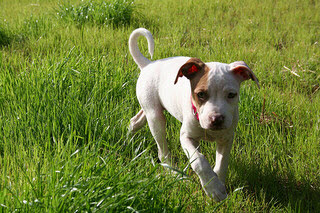+headshot.jpg) Dr. Abby Regner and Dr. Alex Mora, both new
associate veterinarians at
Dr. Abby Regner and Dr. Alex Mora, both new
associate veterinarians at Acupunture may be defined as the stimulation of a specific point on the body with with a specific method, resulting in a therapeutic homeostatic effect. The specific point on the body is called “Shu-xu” or accupuncture point (acupoint).
According to ancient Chinese medical philosophy, disease is the result of an imbalance of energy in the body. Acupuncture is believed to balance this energy and, thereby, assist the body to heal disease. In Western terms, acupuncture can assist the body to heal itself by affecting certain physiological changes. For example, acupuncture can stimulate nerves, increase blood circulation, relieve muscle spasm, and cause the release of hormones like endorphins and cortisol.
Q: When is acupuncture indicated?
Acupuncture is indicated mainly for functional problems such as those that involve pain, non-infectious inflammation (such as allergies), and paralysis. For small animals, the following are some of the general conditions which may be treated with acupuncture:
· Musculoskeletal problems, such as arthritis or vertebral disc pathology
· Skin problems, such as lick granuloma
· Respiratory problems, such as feline asthma
· Gastrointestinal problems, such as diarrhea
· Selected reproductive problems
Q: How
should I choose an acupuncturist for my animals?
There are two important criteria you should look for in a veterinary acupuncturist:
· Your veterinary acupuncturist must be a licensed veterinarian.
· Your veterinary acupuncturist should have formal training in the
practice of acupuncture for animals. There are two important criteria you should look for in a veterinary acupuncturist:
· Your veterinary acupuncturist must be a licensed veterinarian.
 Q: How safe is acupuncture therapy?
Q: How safe is acupuncture therapy?Acupuncture is a very safe medical procedure when administered by a qualified practitioner.
Very few side effects have been found in clinical cases.
Q:
How many treatments are needed?
It
depends upon the nature, severity and duration of diseases. A single treatment may be enough for acute
conditions. A series of 3 to 10
treatments can resolve many chronic problems.
Some degenerative conditions may need monthly treatments over time.
Q:
Does acupuncture hurt?
For small animals,
the insertion of acupuncture needles is virtually painless. Once the needles
are in place, there should be no pain. Most animals become very relaxed and may
even become sleepy. Nevertheless, acupuncture treatment may cause some
sensation, presumed to be those such as tingles, cramps, or numbness which can
occur in humans and which may be uncomfortable to some animals.
Q:
What physiological effects are induced by Acupuncture?
Numerous
studies show that acupuncture stimulation induces these physiological effects:
- Pain relief
- Regulation of
gastrointestinal motility
- Anti-inflammatory
effect
- Immuno-regulation
- Hormone and
reproductive regulation
- Anti-febrile,
effect; microcirculation promotion






